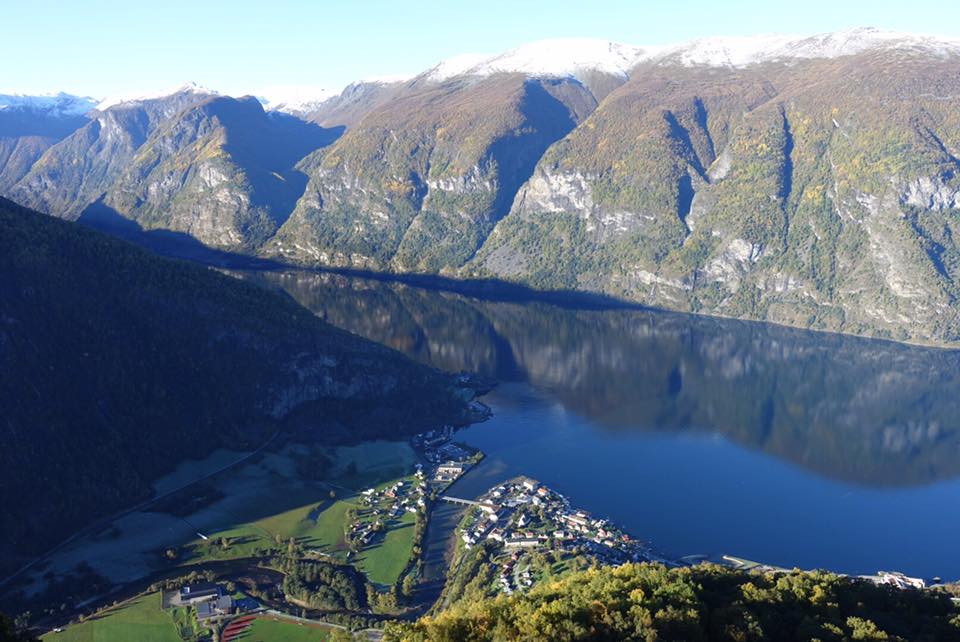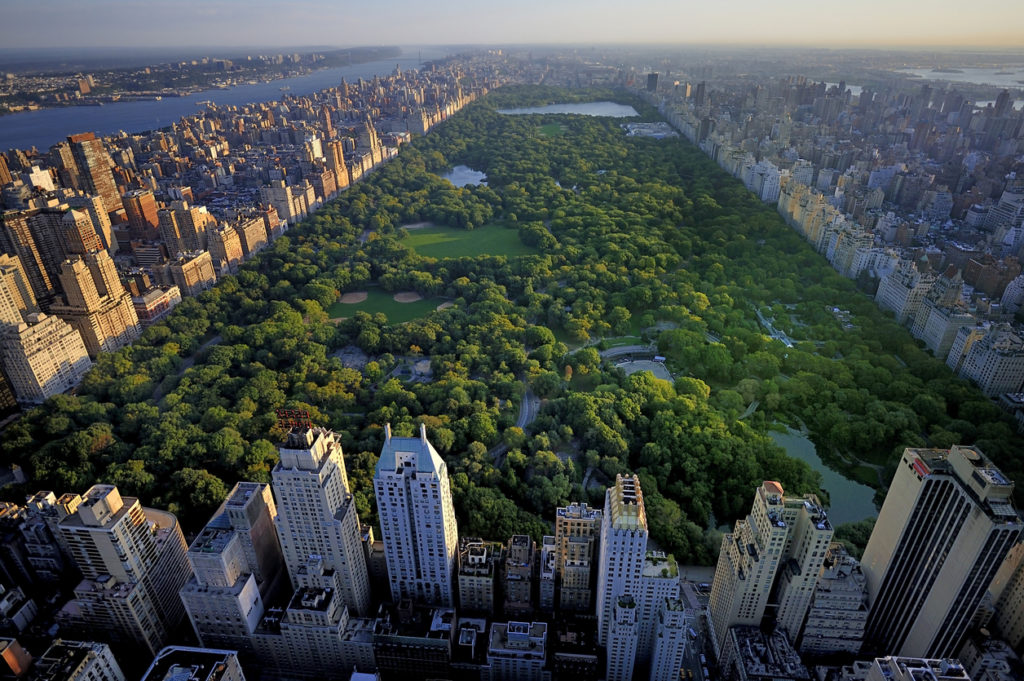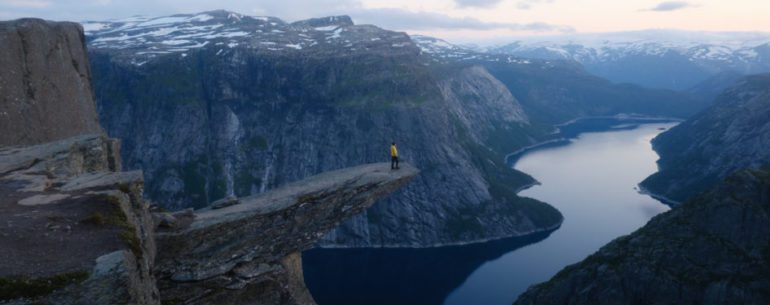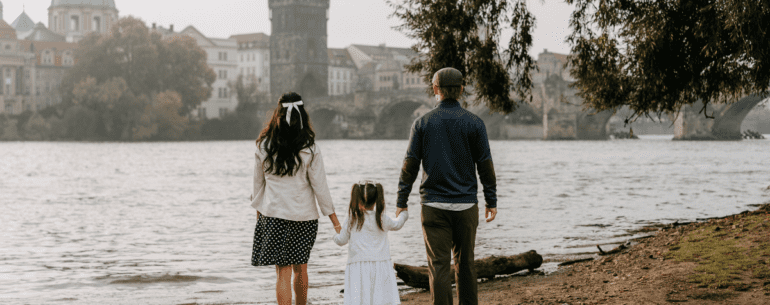I’m an experienced solo traveler. Usually, I’ll meet more people vagabonding alone. But Norway is different. Perhaps due to its high prices, remote location or combination thereof, I encountered zero rebellious hippies, counterculture losers or brainless bleeding hearts.
Nobody attempted to tell me I was from “The Great Satan” or that I’d need to “check my conscience at the airport,” when returning to America (as happened on hiking trails in Patagonia & Peru, respectively). Occasionally, I’d run into a group of twenty-somethings trying to “find themselves” on daddy’s dime, but not enough of them to be obnoxious.
Facing absolute solitude in one of the most beautiful places on earth gave me an opportunity to reclaim control of my directing mind and recharge. I decided to reduce external information in favor of insights and discoveries.
Back to Life (Before the Internet)
On a train headed west from Oslo to Bergen, I started reading a thought-provoking book titled The End of Absence: Reclaiming What We’ve Lost in a World of Constant Connection by Michael Harris.
“If you have any pre-Internet memories at all, you’re carrying around in your head the last versions of certain patterns of thought—your memories of absence, of solitude, of reverie, or daydreaming – they’re all going to go extinct when you die.” -Michael Harris, The End of Absence
Inspired by the book, my Norwegian expedition became a deliberate reversion to pre-internet life. Due to its natural beauty and location on the west coast, Bergen was the perfect place for an experiment in total seclusion. Founded in 1070, the small port city was once the capital of the Kingdom of Norway during the middle ages. Today, its fish market, sunlit harbor and cozy accommodations, make Bergen a prime jumping-off point for challenging hikes, often rewarded with breathtaking views of fjords.

Life Offline in Norway
The goal of my days in Norway was to restrain myself from mindlessly reaching for my iPhone in idle moments. I’d leave it turned off in a backpack while enjoying long hikes and train rides. In hotel rooms, I used my phone only to let Miriam know I was ok; otherwise, no smartphone and pure “appstinence.”
One afternoon hiking near Flåm, I stopped to take in a spectacular view of Nærøyfjord. Perched on a rock, I pondered how it felt to be “off the grid.” I would scribble notes in my journal about life offline, before heading to the next lookout. I’d write instead of taking pictures of jaw-dropping scenery—my way of avoiding temptation to glance at my phone. As a result, I have only six pictures to show for my entire trip. I’m good with that. Reason to go back.

It was October 2016. We were a few weeks short of an historic election in the States (Trump/Hillary). Until my trip, I’d followed every new development in their campaigns. I wanted to know every flub or mishap so I could see how polls would be affected. My interest was two-fold:
- Presidential politics is the ultimate study of communication & salesmanship
- I was “invested” in the election’s outcome on Predictit.org
My Scandinavian sojourn was the first time I’d experimented with “phonelessness” since the release of iPhones in 2007. I put myself on a strict “low-information diet,” which meant no work or financial markets, no sports or political news. For the previous few years, I had gotten in the habit of grabbing my phone for escapism and mindless entertainment, which is what American politics had become.
Surprisingly, I quickly adapted to being without a phone, even enjoyed it. After 72 hours without a device, the thought of returning to a life of constant connection had no appeal. Paradoxically, there’s a sense of fulfillment in not knowing so much.
Benefits of a Nature Walk
Early morning hikes can do wonders for the body and mind. In reading about nature’s benefits one night, I learned people who spend more time in nature are also more productive.
In the early 1900s, Frederick Law Olmsted designed Central Park in New York City because industrialists wanted more productive workers. In addition to increased productivity, long walks in nature have since been proven to have other benefits:
- Increased balance
- Acts as anti-depressant
- Acts as refresher
- Sharpens the mind
- Boosts creativity
Long walks and hikes also rejuvenate the spirit. My experience hiking in Norway was like re-installing my operating system. In those days of solitude, I decided that if knowledge of the ephemeral circumstances of the moment didn’t further the pursuit of my goals, I would train my mind to ignore it. Since life is brief at its longest, no more daily digestion of information that had little or no impact on my ultimate happiness & fulfillment.
“Discipline equals freedom.” – Jocko Willink, former Navy Seal

Choosing to Be Alone
Solitary confinement has been used as a form of torture for centuries. But choosing to be alone has countless benefits. It is no longer believed that regular solitary practices are inherently dysfunctional. We’re long past the days when desire for solitude was reserved for weirdos and schizophrenics.
Explorations of the mind when alone can help you make connections and see patterns. In Robert J. Coplan and Julie C. Bowker’s groundbreaking book, The Handbook of Solitude, the authors concur that solitude helps:
- develop insight
- spark creativity
- generate clarity
- enhance self-esteem
- can be highly therapeutic
Solitude can also be oddly seductive. Sure, it’s awkward in the beginning, but most intimate encounters are at first. It’s sad to think of all the blank spaces now filled with duties to social networks and the relentless demands of smartphone addictions. Kids today may never experience or understand the value in moments of absence and daydreaming. I know I’d be a much lesser version of myself without all the time I spent staring at the ceiling as a lil’ man.
I’m not immune to “technology creep” and its addictive nature—I’m just more mindful of it now when it creeps in. I prefer the infinite levels of revelation that can unfold during idle times instead of endless scrolling. Why would we forego this ability to think? Since the next generation won’t be able to relate, it’s incumbent upon us to pass the benefits of solitude on to them so they can also experience its awesome benefits. But kids will do as you do, not as you say, so we must first be an example.
The Value of Solitude
Much like sleep, solitude can be restorative—it should be viewed as a necessity rather than an objective. Time alone allows you to garner strength and rejuvenate your body & mind for peak performance. It can also help portend meaningful conversation, increasing your value to others and enriching your life.

You don’t need to visit Norway to re-install or reset. Solitude can be found in idle moments almost anywhere. Schedule time alone if you need to. Enter a state of boredom willingly, then use the time to think and reflect. Develop a childlike sense of awe and wonder you may have lost in the demands of adulthood. Protect your attention. Read to learn. Do work that is deep. Start journaling (if you don’t already). And for Christ’s sake, go outside, take long walks and start daydreaming again. But first, turn off your phone!
Additional Reading:
In Praise of Idleness and Other Essays by Bertrand Russell
Walden by Henry David Thoreau




Love the blogs. “I’d write instead of taking pictures of jaw-dropping scenery. It was my way of avoiding temptation to glance at my phone.” My Nikon and journal are the first two things on my packing list at all times. And also… Walden and all things Thoreau are a solid suggestions.
Thanks for the feedback, Adam D! @duped309 is one of my favorite Instagram accounts to follow. Which Nikon do you use?
Appreciate it, I need to be better about posting some of my favorite pics on Instagram. It comes and goes. Concerning the camera, it’s a Nikon D7100 and carry with me a 50mm lense and an 18-140mm. My journal and pen fit neatly into my Lowepro camera bag too.
I’ve been doing things by myself for as long as I can remember. Well before smart phones became a thing. Most people along the way thought it was strange or weird as you stated. I’m sure there are a gamut of reasons why people think like that. IMO the number one reason is insecurity. Placing worry in what others around you and whom you interact with might think. That’s a mindset that a great majority of people struggle with that filters into one’s life in many different ways. Maybe I’m not such a weirdo. Well at least not one in that regard.
I’ve always spent a lot of time alone too. Good insight on worrying what others think. Insecurity could definitely be reason number one why people don’t spend more time alone. There is no quicker route to unhappiness than concern for what other people think; or worse, comparing yourself to others. I think many people don’t enjoy their own company and choose to be “busy” to avoid solitude. In some instances, people are scared of their own thoughts. Ever read about the study where people chose to shock themselves instead of sit alone with their own thoughts for 15 minutes? It’s nuts! https://www.psychologytoday.com/blog/mindfully-happy/201408/alone-your-thoughts
Great post! I love “appstinence.” I definitely don’t mind being bored or letting the kids be bored. It’s good for us.
Thank you! Wise words. Boredom is so good for us.